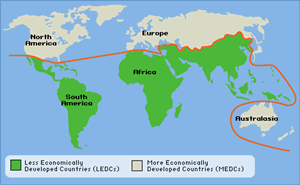Transnational corporations (TNCs) have become an increasingly powerful part of the global economy. These companies are able to merge and acquire each other, to form larger entities which end up dominating the international marketplace. While the aim of TNCs is to make a profit for their investors, they have also come to play a huge part in of our lives - the products we buy, the foods that are sold, the entertainment on offer and so on. Although it seems that the choice of products and services that we want to spend our money on has increased, in fact it can be said that this choice is being made for us by what a small number of giant companies decide to sell. (http://www.munich-business-school.de/intercultural/index.php/Transnational_Corporations:_Concept_and_Relevance)
Impacts of TNCs
Positive
|
Negative
|
Creates jobs
|
Exploitation of workers e.g. China
|
Frees up trade in the world
|
Undercutting local business
|
Invests in the local area e.g. transport
|
Aesthetic issues
|
Pollution
| |
Over powerful
|
Examples of TNCs
Nike:
- Founded in 1971 in Oregon, USA
- Introduced to supply items for marathon running
- Manufactures mainly in Asia, taking advantage of the low production costs
- Approx 260,000 employees
- Founded in 1933
- 8 million vehicle productions a year
- in 2005, they earned over $10billion, which made it the 10th largest company in the world.
- They are the 3rd largest car maker in the world
- They have approx 55 branches in 25 countries, selling in a further 135 countries.
- Set up in 1940's in Sweden
- Went worldwide in 1980's
- Opened their first UK shop in 1987
- In 2005 they had 4.75 million customers worldwide
- They currently have over 200 stores in over 30 countries
- Employ over 90,000 people


